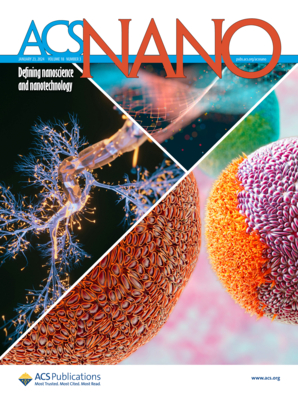In Situ Tumor Surface Modification with Antibody Fragments for Antigen-Independent Versatile Cancer Immunotherapy.
IF 16
1区 材料科学
Q1 CHEMISTRY, MULTIDISCIPLINARY
引用次数: 0
Abstract
Natural killer (NK) cells exert potent cytotoxic effects by releasing perforin, granzyme B, and immune-boosting cytokines upon recognition of antibody-coated targets. However, the heterogeneous expression of tumor antigens poses a major limitation to NK-mediated antibody-dependent cell-mediated cytotoxicity (ADCC). To overcome this challenge, we developed a Universal Antibody (Univody), a recombinant fusion protein that enables an antigen-independent presentation of Fc fragments on the surface of cancer cells. Specifically, the Fc region of human IgG1 was fused with a transmembrane domain and delivered in the form of plasmid DNA, ensuring stable membrane localization and interaction with NK cell receptors. For efficient and selective delivery, we employed a phenylboronic acid (PBA)-modified lipopolyplex (LPP-PBA), which significantly enhanced cellular uptake and transfection efficiency while reducing cytotoxicity. The plasmid DNA encoding Univody (pUnivody) effectively decorated a variety of heterogeneous tumor types with Fc fragments, leading to NK cell activation and enhanced immune responses in the tumor microenvironment. In vivo, pUnivody@LPP-PBA treatment resulted in marked tumor inhibition in both triple-negative breast cancer and melanoma models. This antigen-independent platform broadens the scope of antibody therapy and immunotherapy, offering a versatile approach to treating multiple types of cancers.用抗体片段原位修饰肿瘤表面用于不依赖抗原的多功能癌症免疫治疗。
自然杀伤(NK)细胞通过释放穿孔素、颗粒酶B和免疫增强细胞因子来识别抗体包被的靶标,从而发挥强大的细胞毒性作用。然而,肿瘤抗原的异质表达对nk介导的抗体依赖性细胞介导的细胞毒性(ADCC)造成了主要限制。为了克服这一挑战,我们开发了一种通用抗体(Univody),这是一种重组融合蛋白,可以使Fc片段在癌细胞表面不依赖抗原呈递。具体来说,人IgG1的Fc区与跨膜结构域融合并以质粒DNA的形式传递,确保了稳定的膜定位和与NK细胞受体的相互作用。为了高效和选择性的传递,我们使用了苯硼酸(PBA)修饰的脂质复合物(LPP-PBA),它显著提高了细胞摄取和转染效率,同时降低了细胞毒性。编码Univody (pUnivody)的质粒DNA可以用Fc片段有效修饰多种异质肿瘤类型,从而激活NK细胞,增强肿瘤微环境中的免疫应答。在体内,pUnivody@LPP-PBA治疗在三阴性乳腺癌和黑色素瘤模型中均产生明显的肿瘤抑制作用。这种不依赖抗原的平台拓宽了抗体治疗和免疫治疗的范围,为治疗多种类型的癌症提供了一种通用的方法。
本文章由计算机程序翻译,如有差异,请以英文原文为准。
求助全文
约1分钟内获得全文
求助全文
来源期刊

ACS Nano
工程技术-材料科学:综合
CiteScore
26.00
自引率
4.10%
发文量
1627
审稿时长
1.7 months
期刊介绍:
ACS Nano, published monthly, serves as an international forum for comprehensive articles on nanoscience and nanotechnology research at the intersections of chemistry, biology, materials science, physics, and engineering. The journal fosters communication among scientists in these communities, facilitating collaboration, new research opportunities, and advancements through discoveries. ACS Nano covers synthesis, assembly, characterization, theory, and simulation of nanostructures, nanobiotechnology, nanofabrication, methods and tools for nanoscience and nanotechnology, and self- and directed-assembly. Alongside original research articles, it offers thorough reviews, perspectives on cutting-edge research, and discussions envisioning the future of nanoscience and nanotechnology.
 求助内容:
求助内容: 应助结果提醒方式:
应助结果提醒方式:


